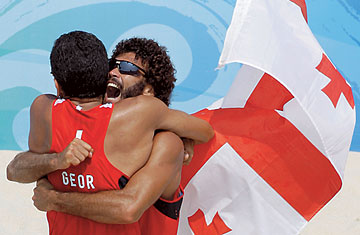
RINGERS: Brazilians nabbed bronze for Georgia
It might have seemed like patriotism gone wild when the two members of Georgia's men's beach-volleyball team stitched the nicknames "Geor" and "Gia" onto their uniforms, spelling out the name of their besieged nation. But there's a twist: neither of the players is really Georgian. Renato Gomes and Jorge Terceiro are towering Brazilian imports recruited by Georgian President Mikheil Saakashvili for the sole purpose of representing his country in the Olympics.
More athletes than ever are competing in Beijing under flags (and, in some cases, names) different from the ones under which they were born. While some see this border-jumping as a symbol of how sport transcends nationality, giving some worthy athletes a chance to escape hardship in their home countries, others see it as a potential violation of the Olympic spirit. "What is not legitimate," Jacques Rogge, the International Olympic Committee chief, has said, "is when an athlete sells himself as a mercenary."
The gold medalists in recruiting foreign-born athletes are Qatar and Bahrain, tiny oil-rich Gulf states that have shelled out millions of dollars to persuade top African runners to change their citizenship. But many other nations play this game. Russia, for example, recruited two Americans to lead its men's and women's basketball teams. The strategy can pay off. Moroccan-born Rashid Ramzi gave Bahrain its first-ever track-and-field gold on Aug. 19 when he won the men's 1,500-m. In a globalized era, even athletic excellence can be outsourced.